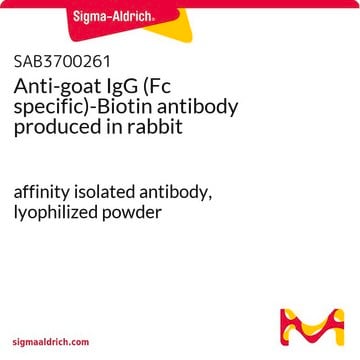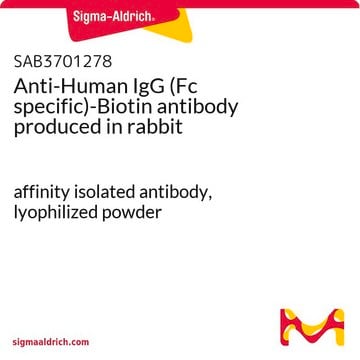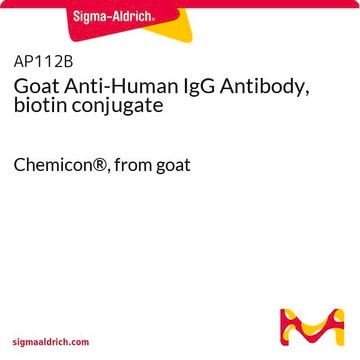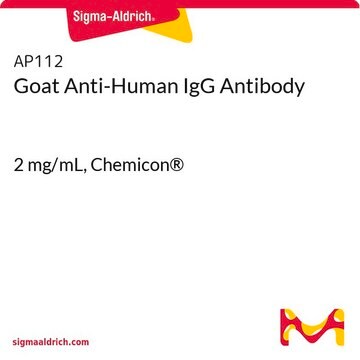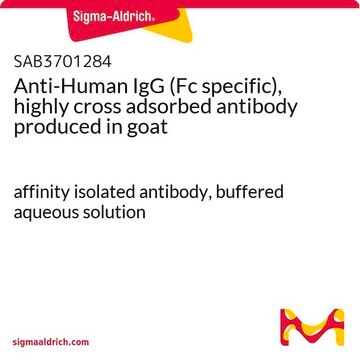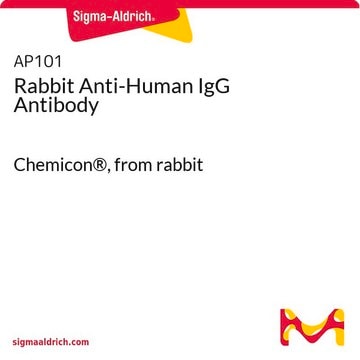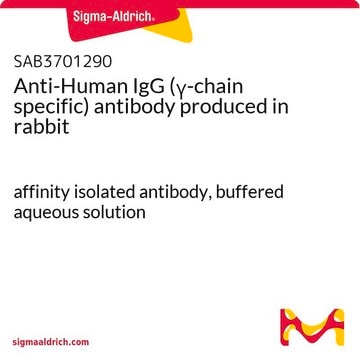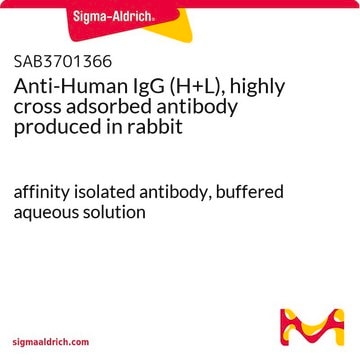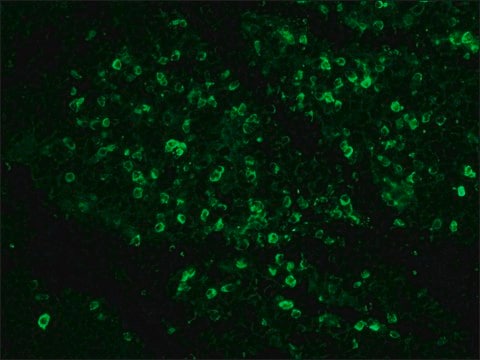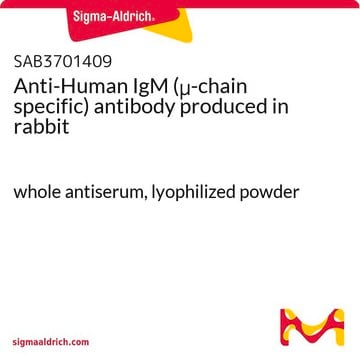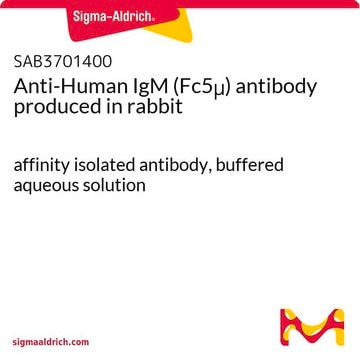SAB3701275
Anti-Human IgG (Fc specific) antibody produced in rabbit
affinity isolated antibody, buffered aqueous solution
Szinonimák:
Anti-Human IgG
Bejelentkezésa Szervezeti és Szerződéses árazás megtekintéséhez
Összes fotó(1)
About This Item
UNSPSC kód:
12352203
NACRES:
NA.46
Javasolt termékek
biológiai forrás
rabbit
Minőségi szint
konjugátum
unconjugated
antitest forma
affinity isolated antibody
antitest terméktípus
secondary antibodies
klón
polyclonal
Forma
buffered aqueous solution
faj reaktivitás
human
koncentráció
3.0 mg/mL
technika/technikák
immunohistochemistry: suitable
indirect ELISA: suitable
western blot: suitable
kiszállítva
wet ice
tárolási hőmérséklet
2-8°C
célzott transzláció utáni módosítás
unmodified
Általános leírás
Immunoglobulin G (IgG) belongs to the immunoglobulin family. It is widely expressed and consists of a gamma (γ) heavy chain in the constant (C) region. IgG is a monomer with a molecular weight of about 150 kDa. The structure of IgG constitutes two identical heavy chains and two identical light chains with molecular weight of 50 kDa and 25 kDa respectively. The primary structure of this antibody also contains disulfide bonds involved in linking the two heavy chains, linking the heavy and light chains and resides inside the chains. IgG is further subdivided into four classes namely, IgG1, IgG2, IgG3, and IgG4 with different heavy chains, named γ1, γ2, γ3, and γ4, respectively. Limited digestion using papain cleaves the antibody into three fragments, two of which are identical and contain the antigen-binding activity. The third fragment does not possess antigen-binding activity and is known as fragment crystallizable (Fc). It interacts with cells and effector molecules. The Fc fragment contains the CH2 and CH3 domains of the antibody molecule. Maternal IgG is the only antibody transported across the placenta to the fetus. It passively immunizes the infants.
Egyediség
This product was prepared from monospecific antiserum by immunoaffinity chromatography using Human IgG coupled to agarose beads followed by solid phase adsorption(s) to remove any unwanted reactivities. Assay by immunoelectrophoresis resulted in a single precipitin arc against Anti-Rabbit Serum, Human IgG, Human IgG F(c) and Human Serum. No reaction was observed against Human IgG F(ab′)2.
Immunogén
Human IgG F(c) fragment
Alkalmazás
Anti-Human IgG (Fc specific) antibody produced in rabbit has been used as a control in cysteine-rich angiogenic inducer 61 (CYR61) blocking experiment.
Fizikai tulajdonságok
Antibody format: IgG
Fizikai forma
Supplied in 0.02 M Potassium Phosphate, 0.15 M Sodium Chloride, pH 7.2
Jogi nyilatkozat
Unless otherwise stated in our catalog or other company documentation accompanying the product(s), our products are intended for research use only and are not to be used for any other purpose, which includes but is not limited to, unauthorized commercial uses, in vitro diagnostic uses, ex vivo or in vivo therapeutic uses or any type of consumption or application to humans or animals.
Nem találja a megfelelő terméket?
Próbálja ki a Termékválasztó eszköz. eszközt
Tárolási osztály kódja
10 - Combustible liquids
Lobbanási pont (F)
Not applicable
Lobbanási pont (C)
Not applicable
Válasszon a legfrissebb verziók közül:
Már rendelkezik ezzel a termékkel?
Az Ön által nemrégiben megvásárolt termékekre vonatkozó dokumentumokat a Dokumentumtárban találja.
Az ügyfelek ezeket is megtekintették
Yu-Ting Huang et al.
Oncotarget, 8(6), 9200-9215 (2016-12-03)
Matricellular proteins play multiple roles in primary tumor growth, local invasion and tumor angiogenesis. However, their contribution to metastasis and the putative mechanisms involved are less well characterized. In ER-negative human breast cancer, elevated expression levels of the matricellular protein
The matricellular protein CYR61 promotes breast cancer lung metastasis by facilitating tumor cell extravasation and suppressing anoikis
Yu-Ting H et al.
Oncotarget, 8(6), 9200-9200 (2017)
The structure of a typical antibody molecule
Immunobiology: The Immune System in Health and Disease (2001)
Manman Lu et al.
Archives of virology, 165(4), 845-851 (2020-02-14)
Porcine deltacoronavirus (PDCoV) is a novel coronavirus that can cause vomiting and watery diarrhea in pigs and death in piglets. Since PDCoV was first detected in 2009 in Hong Kong, the prevalence of PDCoV has increased in recent years, resulting
Zhe-Wei Yang et al.
Sensors (Basel, Switzerland), 22(4) (2022-02-27)
A graphene-based surface plasmon resonance (SPR) prism coupler sensor is proposed for the rapid detection of immunoglobulin G (IgG) antibodies. The feasibility of the proposed sensor is demonstrated by measuring the IgG concentration in phantom mouse and human serum solutions
Tudóscsoportunk valamennyi kutatási területen rendelkezik tapasztalattal, beleértve az élettudományt, az anyagtudományt, a kémiai szintézist, a kromatográfiát, az analitikát és még sok más területet.
Lépjen kapcsolatba a szaktanácsadással
